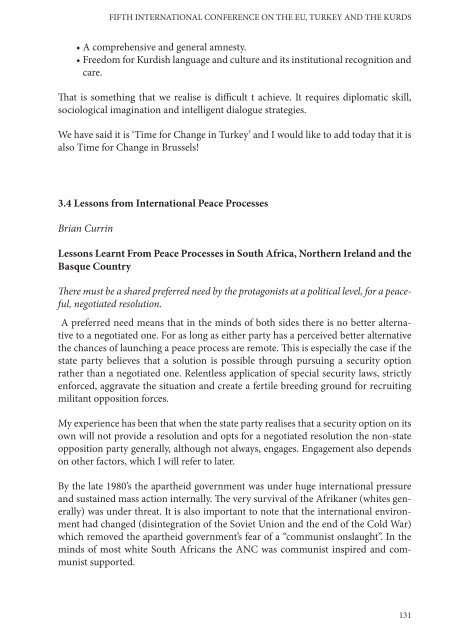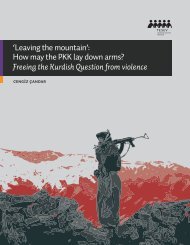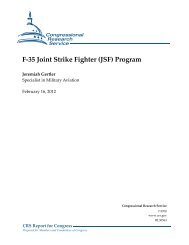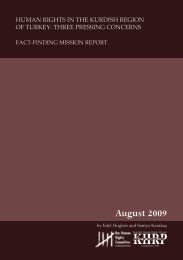FIFTH INTERNATIONAL CONFERENCE ON THE EU TURKEY AND THE KURDS
fifth international conference on the eu, turkey and the kurds
fifth international conference on the eu, turkey and the kurds
Create successful ePaper yourself
Turn your PDF publications into a flip-book with our unique Google optimized e-Paper software.
<strong>FIFTH</strong> <strong>INTERNATI<strong>ON</strong>AL</strong> <strong>C<strong>ON</strong>FERENCE</strong> <strong>ON</strong> <strong>THE</strong> <strong>EU</strong>, <strong>TURKEY</strong> <strong>AND</strong> <strong>THE</strong> <strong>KURDS</strong><br />
<br />
<br />
care.<br />
That is something that we realise is difficult t achieve. It requires diplomatic skill,<br />
sociological imagination and intelligent dialogue strategies.<br />
We have said it is ‘Time for Change in Turkey’ and I would like to add today that it is<br />
also Time for Change in Brussels!<br />
3.4 Lessons from International Peace Processes<br />
Brian Currin<br />
Lessons Learnt From Peace Processes in South Africa, Northern Ireland and the<br />
Basque Country<br />
There must be a shared preferred need by the protagonists at a political level, for a peaceful,<br />
negotiated resolution.<br />
A preferred need means that in the minds of both sides there is no better alternative<br />
to a negotiated one. For as long as either party has a perceived better alternative<br />
the chances of launching a peace process are remote. This is especially the case if the<br />
state party believes that a solution is possible through pursuing a security option<br />
rather than a negotiated one. Relentless application of special security laws, strictly<br />
enforced, aggravate the situation and create a fertile breeding ground for recruiting<br />
militant opposition forces.<br />
My experience has been that when the state party realises that a security option on its<br />
own will not provide a resolution and opts for a negotiated resolution the non-state<br />
opposition party generally, although not always, engages. Engagement also depends<br />
on other factors, which I will refer to later.<br />
By the late 1980’s the apartheid government was under huge international pressure<br />
and sustained mass action internally. The very survival of the Afrikaner (whites generally)<br />
was under threat. It is also important to note that the international environment<br />
had changed (disintegration of the Soviet Union and the end of the Cold War)<br />
which removed the apartheid government’s fear of a “communist onslaught”. In the<br />
minds of most white South Africans the ANC was communist inspired and communist<br />
supported.<br />
131





